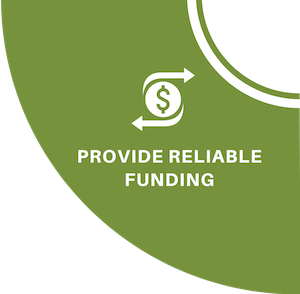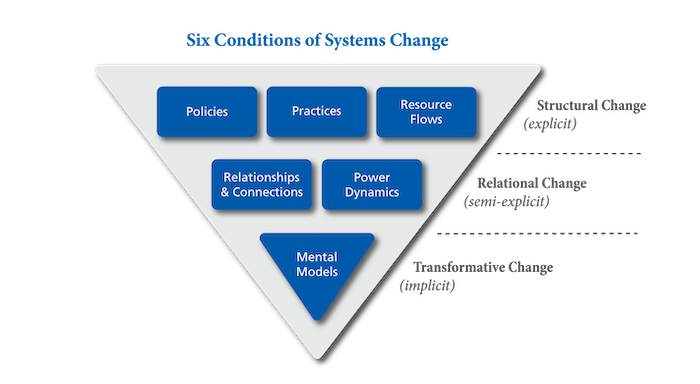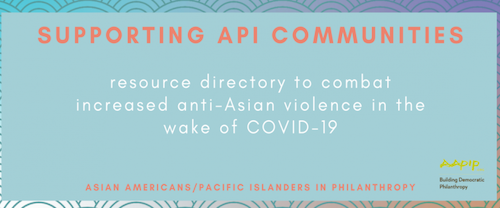Site Search
- resource provided by the Forum Network Knowledgebase.
Search Tip: Search with " " to find exact matches.

- 6 Practices of Trust-Based Philanthropy
- Trust-Based Philanthropy Resources
- Grantmakers for Effective Organizations: Systems Grantmaking Resource Guide
- Solving the World’s Biggest Problems: Better Philanthropy Through Systems Change
- Trust-Based Philanthropy News
- The Holy Grail of Funding: Why and how foundations give unrestricted funding
- The Casey Foundation’s Journey to Equitable Grant-making
- Community-Centric Fundraising
- Vu Le, Nonprofitaf.com
- To Support Shifts in Philanthropic Practices, Foundations Must Reimagine Their Internal Structures and Processes
Doing Good Better, a partnership of the Council of New Jersey Grantmakers and the New Jersey Center for Nonprofits, is a community of funders and nonprofits taking action against the power imbalances and racial inequities in philanthropy, nonprofits, and government.
Multi-year Grants
Affirmation: Multi-year funds provided both reliability and breathing room for nonprofits.
Making fundamental and long-lasting change comes with the promise of reliable investments. Longer grant terms create an environment where collaborative partnerships can flourish, and trust and transparency break down power dynamics. The result is that nonprofits have the “breathing room” and financial stability to focus activities where they are most needed.
Although many funders award grants to the same nonprofits year after year, they often require submission of annual applications that request information they already have and are complex and needlessly lengthy. These processes can heighten mutual distrust. From a practical standpoint, multi-year awards reduce paperwork for both funder and nonprofit and open communication channels promoting shared goals, mutual trust, and increased overall impact.
Activities
• For funders that historically award repeat annual grants to the same nonprofit partners, shift from an annual grant/proposal cycle to a long-term, multi-year commitment with an annual outcomes/progress report in lieu of a full application.
• Tailor grant terms to suit grantee timelines and needs (negotiated outcomes and milestones).
• If data collection is required solely to meet a funder’s compliance requirements, the funder should assume this responsibility or provide sufficient funding and/or capacity for the nonprofit to meet the requirement.
Short-term Outcomes
• The number of funders making multi-year grants increases by 50% over the previous years.
Long-term Outcomes
• More funders convert an annual application process for repeat grantee partners to a multi-year commitment with an annual outcomes report at the most, instead of full proposals each year.
• Funders assume responsibility for data collection or provide sufficient funding and/or capacity for the nonprofit to meet the requirement.
• Grant terms are suited to grantee timelines and needs (negotiated outcomes and milestones).
How to Begin Doing Good Better on Reliability
Learning opportunities
• What barriers keep funders from making long-term commitments to repeat grantee partners? Are any of these barriers legal?
• What are the minimum data requirements for funders to collect from repeat grantee partners?
Pre-Work
• Address the barriers to awarding multi-year grants through tested tools.
• Learn about how multi-year grants strengthen grantee partners and improve philanthropic, nonprofit, and community impact.
• Research mechanisms funders can use to meet legal compliance requirements while gaining trust in their grantee partners.
Welcome to the Council of New Jersey Grantmakers’ Foundation Funding Map, where members have free access to accurate, up-to-date grantmaking data critical to smart, strategic giving that makes the biggest impact.
The data shown on the map is from CNJG member and non-member foundations, corporate giving programs and others that have submitted their grants data through this Get on the Map! Campaign. The greater the number of funders that submit their data, using the template, the more complete this picture of how funds are distributed in New Jersey will be.
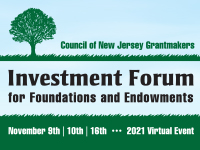
Dates & Times
Tuesday, November 9 - 1:00 to 5:00 p.m.
Wednesday, November 10 - 1:00 to 5:00 p.m.
Tuesday, November 16 - 1:00 to 5:00 p.m.
CEOs, executive directors, CFOs, trustees, investment committee members, and finance managers of foundations and endowed nonprofits gathered together over three afternoons of learning and discussion during CNJG’s 2021 Investment Forum for Foundations and Endowments.
Attendees heard from leading asset managers, financial service institutions, professional advisors and practitioners who shared best practices and valuable insights focused on successful endowment management. Pointed, strategic, and masterful keynote speeches and educational workshop sessions explored a wide range of timely and useful topics, such as impact and ESG investing, gift acceptance policies, alternative investments, governance and due diligence, and so much more.
Sustainable philanthropy thrives on careful and skillful stewardship of the corpus. This signature event grew out of the Council of New Jersey Grantmakers’ Finance and Investment Affinity Group convenings, which have long offered CFO’s, investment committee members, board chairs and others with oversight of their endowment, exposure to a wide range of representatives, as well as thoughtful expertise and perspectives from the investment community.
Access Whova until May 16, 2022!
Registrants can access all three plenary sessions and 11 concurrent sessions on Whova for six months after the event, until May 16, 2022. You can log in with the same email and password you used to access the event. Visit Whova.
For questions, please contact Anna D'Elia, Manager of Programs and Learning.
Shifting Narratives to Change Systems
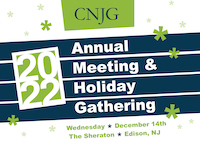 Wednesday, December 14, 11:00 am – 3:00 pm
Wednesday, December 14, 11:00 am – 3:00 pm
Luncheon & Keynote Presentation
Location: The Sheraton, Edison, 125 Raritan Center Parkway, Edison, NJ 08837
Friday, December 16, 11:00 – 12:15 pm
Virtual Workshop via Zoom
The Council of New Jersey Grantmakers thanks everyone who attended our 2022 Annual Meeting & Holiday Luncheon and the Virtual Workshop! We were delighted to see so many familiar faces, and meet many new staff and trustees of our members.
At the business meeting, members elected the new class of trustees, and heard reports about the state of the organization. After lunch and time to reconnect with each other, we heard from our keynote, Bridgit Antoinette Evans, who explained the narrative ocean in which philanthropy swims, and gave examples of how Pop Culture Collaborative is funding organizations to reframe their narratives in which they operate.
During the virtual workshop, members learned about the changemaker experience, how it affects the relationships between funders and their nonprofit partners and even grantseekers. Attendees were led through an exercise to create a journey map, and think through strategies how to examine the experiences that nonprofits have with their organizations.
CNJG members can view recordings and additional resources from the event on the resources tab, when logged in.
Philanthropic Collaboratives:
Driving Impact and Opportunity
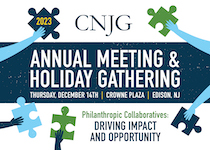 Thursday, December 14, 2023 - 9:00am to 3:00pm
Thursday, December 14, 2023 - 9:00am to 3:00pm
Luncheon, Keynote Presentation & Workshop
Location: Crowne Plaza Edison, 2055 Lincoln Highway, Edison, NJ 08817
The Council of New Jersey Grantmakers thanks everyone who attended our 2023 Annual Meeting & Holiday Luncheon and the Pre-Meeting Workshop that explored Philanthropic Collaboratives: Driving Impact and Opportunity. We were thrilled to reconnect with friends and colleagues and meet new members.
At the Business meeting, the membership elected the new class of Trustees. We also honored our outgoing Board Chair, Jeff Vega, for all the incredible work he accomplished during his term. After lunch and networking time, we listened attentively to Nidhi Sahni, Partner and Head of US Advisory Group, New York, Bridgespan, and Lucy Vandenberg, Executive Director of the Schumann Fund for New Jersey in conversation about the nuances and benefits of collaboration.
At the pre-meeting workshop, Tools for Funder Collaboration, presented by John Harper, Chirlie Felix, and Waheera Mardah of FSG, members were presented multiple models of collaboration and examples of collective impact followed by an opportunity to engage in dynamic discussion to further explore the concepts.
CNJG members can view the FSG PowerPoint and additional resources from the event on the resources tab, when logged in.
Native Voices Rising is a joint research and re-granting project of Native Americans in Philanthropy and Common Counsel Foundation. This report focuses on the practices and challenges of community organizing and advocacy, focusing on the need for increased investment in and sustained support for American Indian, Alaska Native and Native Hawaiian communities.

There is a plurality of definitions of the term systems change, each contextualized within different cultures and purposes. Doing Good Better embraces systems change as an inter-sector process that addresses complex social problems nonprofits and funders confront with collective action centered on equity, mutual respect, and resilience. Systems change refers to changing the parts and their relationships within a system with the understanding that this change will have ripple effects. As grantmakers, we need to create an environment that enables grantee effectiveness, so they can deliver on their mission. Systems change in philanthropy focuses on structures, policies and processes, resources, values, power, mindsets and, infrastructure that is illustrated in three iterative phases. In time, we hope that the application of this model will result in collective impact and a more resilient social sector for all of New Jersey.
The first phase is structural (operational) change, which involves funders adopting new policies, practices, and resource flows. The second phase is characterized by new relationships and connections that emerge from structural change eschewing old power dynamic practices. Finally, the third phase is transformative change, which occurs when change becomes rooted in organizational culture and mores. We cannot underestimate the length of time and learning at each stage. Achieving transformative change can be a long journey, but it is a learning journey. One grantmaker stated, “One change led to another and another, like dominos. I started to see what people meant by systemic change. New energy and excitement surged among us as hope grew and the cloudy vision of what we wanted became clearer and clearer.”
Although the figure below displays the six developmental stages as linear and distinct, change is unlikely to follow a linear path. Any change in a system will seldom stay fixed at one of these stages but rather will shift back and forth from one stage to another on the path toward the ideal state. We believe just one organization can’t shift the conditions that hold problems in place; we all must share the same perspectives and move the sector together and simultaneously. We call for all of those involved in the sector to work together to build a better and more equitable nonprofit and philanthropy system for all New Jerseyans.
Graphic comes from “The Water of Systems Change” by John Kania, Mark Kramer, and Peter Senge.
Doing Good Better, a partnership of the Council of New Jersey Grantmakers and the New Jersey Center for Nonprofits, is a community of funders and nonprofits taking action against the power imbalances and racial inequities in philanthropy, nonprofits, and government.
The Trust-Based Philanthropy Project is pleased to announce a six-part webinar series addressing common questions, clarifying misconceptions, and exploring ways to overcome obstacles in implementing trust-based philanthropy. CNJG is pleased to share this opportunity with our members.
Series Description: Trust-based philanthropy is a philosophy and approach rooted in values of relationship-building, mutual learning, and systemic equity – with a vision of advancing a healthier and more impactful nonprofit sector. While this approach is generally associated with six core grantmaking practices such as multi-year unrestricted funding and streamlined paperwork, the day-to-day work of trust-based philanthropy is very nuanced and dynamic. In fact, funders who have embraced this approach are finding that it requires ongoing self-reflection and rigor with regards to how they think about – and evolve – many of the deeply embedded practices and assumptions of traditional philanthropy.
Given these nuances, it is not surprising that there are many questions and occasional misperceptions about what it actually means to embody trust-based philanthropy in practice. In this 6-part webinar series, the Trust-Based Philanthropy Project will explore some of the most commonly asked questions and the underlying misperceptions that may be roadblocks to understanding and operationalizing trust-based philanthropy.
Each session in the series will focus on a frequently asked question from the field, and will feature perspectives from foundation leaders and others who have grappled with similar or related questions. At the end of each session, participants will walk away with: 1) a deeper and more nuanced understanding of the underlying cultural philosophy of trust-based philanthropy; 2) tips for how to think about and approach these nuances in their own work; and 3) talking points for how to answer these FAQs when they come up from colleagues or peers.
Each session will also provide dedicated space for small-group peer dialogue (among CNJG members) about ways to implement these practices into your grantmaking.
Cost: Free
Who should attend: Anyone in a grantmaking role that is curious about understanding the nuances of trust-based philanthropy and how it applies to your work. This series will be ideal for those who have some baseline familiarity with trust-based philanthropy and have questions about how it manifests in practice.
Please note: this webinar series is separate from CNJG’s 2023 Conference for the Social Sector, which features an in-person luncheon keynote by the Trust-Based Philanthropy Project. CNJG’s conference is open to both funders and nonprofits, so the keynote will differ from this series. Because CNJG’s Doing Good Better initiative leans on the principles of Trust-Based Philanthropy, we encourage our members to register for these sessions - as time allows - for funders to learn about different approaches to changing systems in New Jersey.
Demystifying Trust-Based Philanthropy Series Sessions
Session #1: Does Trust-Based Mean Unconditional Trust?
Session #2: Does Unrestricted Funding Automatically Make a Funder Trust-Based?
Session #3: How Do We Approach Risk and Due Diligence in Trust-Based Philanthropy?
Session #4: What Does Grantee Accountability Look Like in Trust-Based Funding?
Session #5: How Do You Measure Impact in Trust-Based Philanthropy?
Session #6: What Does Racial Equity Have To Do With Trust-Based Philanthropy?
Resources
Recording: Session 5: How Do You Measure Impact in Trust-Based Philanthropy?
Transcript: Session 5: How Do You Measure Impact in Trust-Based Philanthropy?
Presentation: Session 5: How Do You Measure Impact in Trust-Based Philanthropy?
Trust-Based Philanthropy Peer Exchange for Grantmakers
The 6 Practices of Trust-Based Philanthropy
Trust-Based Philanthropy in 4D Overview
Trust-Based Philanthropy Story Map
Trust-Based Framework for Learning and Evaluation
Headwaters Foundation Grant Reporting Process
AJWS Accompaniment Model
Satterberg Foundation's Insight Circles Report
Headwaters Foundation Learning Book
AJWS Social Movements Tool
Center for Effective Philanthropy Blog: Rigorous Evaluation Versus Trust-Based Learning: Is This a Valid Dichotomy?
The Trust-Based Philanthropy Project is pleased to announce a six-part webinar series addressing common questions, clarifying misconceptions, and exploring ways to overcome obstacles in implementing trust-based philanthropy. CNJG is pleased to share this opportunity with our members.
Series Description: Trust-based philanthropy is a philosophy and approach rooted in values of relationship-building, mutual learning, and systemic equity – with a vision of advancing a healthier and more impactful nonprofit sector. While this approach is generally associated with six core grantmaking practices such as multi-year unrestricted funding and streamlined paperwork, the day-to-day work of trust-based philanthropy is very nuanced and dynamic. In fact, funders who have embraced this approach are finding that it requires ongoing self-reflection and rigor with regards to how they think about – and evolve – many of the deeply embedded practices and assumptions of traditional philanthropy.
Given these nuances, it is not surprising that there are many questions and occasional misperceptions about what it actually means to embody trust-based philanthropy in practice. In this 6-part webinar series, the Trust-Based Philanthropy Project will explore some of the most commonly asked questions and the underlying misperceptions that may be roadblocks to understanding and operationalizing trust-based philanthropy.
Each session in the series will focus on a frequently asked question from the field, and will feature perspectives from foundation leaders and others who have grappled with similar or related questions. At the end of each session, participants will walk away with: 1) a deeper and more nuanced understanding of the underlying cultural philosophy of trust-based philanthropy; 2) tips for how to think about and approach these nuances in their own work; and 3) talking points for how to answer these FAQs when they come up from colleagues or peers.
Each session will also provide dedicated space for small-group peer dialogue (among CNJG members) about ways to implement these practices into your grantmaking.
Cost: Free
Who should attend: Anyone in a grantmaking role that is curious about understanding the nuances of trust-based philanthropy and how it applies to your work. This series will be ideal for those who have some baseline familiarity with trust-based philanthropy and have questions about how it manifests in practice.
Please note: this webinar series is separate from CNJG’s 2023 Conference for the Social Sector, which features an in-person luncheon keynote by the Trust-Based Philanthropy Project. CNJG’s conference is open to both funders and nonprofits, so the keynote will differ from this series. Because CNJG’s Doing Good Better initiative leans on the principles of Trust-Based Philanthropy, we encourage our members to register for these sessions - as time allows - for funders to learn about different approaches to changing systems in New Jersey.
Demystifying Trust-Based Philanthropy Series Sessions
Session #1: Does Trust-Based Mean Unconditional Trust?
Session #2: Does Unrestricted Funding Automatically Make a Funder Trust-Based?
Session #3: How Do We Approach Risk and Due Diligence in Trust-Based Philanthropy?
Session #4: What Does Grantee Accountability Look Like in Trust-Based Funding?
Session #5: How Do You Measure Impact in Trust-Based Philanthropy?
Session #6: What Does Racial Equity Have To Do With Trust-Based Philanthropy?
Resources
Recording: Session 4: What Does Grantee Accountability Look Like in Trust-based Philanthropy?
Transcript: Session 4: What Does Grantee Accountability Look Like in Trust-based Philanthropy?
Presentation: Session 4: What Does Grantee Accountability Look Like in Trust-based Philanthropy?
Trust-Based Philanthropy Peer Exchange for Grantmakers
The 6 Practices of Trust-Based Philanthropy
Trust-Based Philanthropy in 4D Overview
Charlize Theron Africa Outreach Project Welcome Packet
Center for Effective Philanthropy’s Grantee and Applicant Perception Report
Culture Workers often face inconsistent income and undervaluation of their work. Traditional budgeting models leave many without (or lack adequate support of) fair compensation using the belief that mission-motivation and passion for the work replaces the need for competitive salaries. The Solidarity Economy is an innovative and inclusive economic framework that prioritizes social justice, environmental sustainability, and community well-being. Join us for a compelling conversation about funding practices that use a solidarity-based approach and find out what New Jersey funders are learning about local compensation trends from the ArtsPay NJ report. Together we will explore ways to advocate and take action around worker pay equity and beyond.
Panelists:
John McEwen, Executive Director – New Jersey Theatre Alliance
Erica Nagel, Deputy Director – New Jersey Theatre Alliance
Eddie Torres, President & CEO – Grantmakers in the Arts
Moderator:
Diane Felcyn, Program Officer – New Jersey State Council on the Arts
Webinar Video
Resources
Solidarity Not Charity: Arts & Culture Grantmaking in the Solidarity Economy - Grantmakers in the Arts
Solidarity Economy Resources - Grantmakers in the Arts
Grants to Worker Cooperatives & Small Businesses — The Reader - Grantmakers in the Arts
Grantmakers’ Changes in Practice 2023 — The Reader - Grantmakers in the Arts
Support for Individual Artists’ Committee - Grantmakers in the Arts
ArtsPay NJ - New Jersey Theatre Alliance
ArtsPay NJ - Information, Reports, and Dashboard
ArtsPay NJ - Interactive Dashboard
ArtsPay NJ - Full Report
ArtsPay NJ - Summary Report
Webinars
Upcoming: Wednesday, October 23
Move the Money: Nuts & Bolts: Making Grants to Cooperatively Owned Small Businesses
Previous
Move the Money: Grantmakers in the Arts & Art.Coop Solidarity Economy Discussion Series
Move the Money Series: Guaranteed Income
Move the Money: The Richness of Southern Soils: Supporting Black Farming and Food
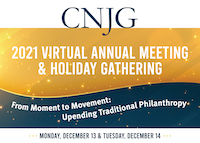
From Moment to Movement: Upending Traditional Philanthropy
Dates & Time:
Monday, December 13 - 2:00 to 3:30 pm -- Annual Meeting Workshop
Tuesday, December 14 - 12:30 to 2:00 pm -- Business Meeting & Keynote Presentation
The Council of New Jersey Grantmakers thanks everyone who attended our 2021 Virtual Annual Meeting & Holiday Gathering.
The 2021 Annual Meeting, From Moment to Movement: Upending Traditional Philanthropy, tackled how we can implement practices based in trust, confront uneven power structures, and advance equity in the philanthropic sector.
Our Annual Meeting Workshop on December 13 explored how two foundations, The Claneil Foundation and Weingart Foundation, are using general operating support, multi-year funding, and transparent communication and feedback to build strong, effective relationships with nonprofit partners. Afterwards, funders discussed where they want to move the needle in their own organization, and the major barriers to implementing those changes.
On Day 2, we heard an inspiring keynote presentation from Marcus Walton, President and CEO of Grantmakers for Effective Organizations (GEO). Marcus kicked off the keynote by sharing critical insights for building trust within and outside your organization. He then engaged in a candid conversation with CNJG President and CEO Maria Vizcarrondo, and answered questions from attendees, on how to reach communities, rethink traditional grantmaking practices, and advance racial equity within philanthropy and New Jersey.
Philanthropy needs to change to meet this moment. Breaking away from ingrained structures and replacing outdated “best practices” with strategies based in trust and power sharing is a long and challenging road for many grantmaking organizations. There will be growing pains. But, during this year’s Annual Meeting & Holiday Gathering, we heard about effective strategies from courageous leaders that have made these changes possible. Join us in 2022 as we continue to rework, reimagine, and operationalize new practices that better serve our partners and communities.
CNJG members can view recordings from the event and additional resources when logged in.
In response to the murders of George Floyd, Breonna Taylor, Tony McDade, Ahmaud Arbery, and countless other Black individuals, we have seen a call to end systemic racism, police brutality, and injustice. To explore philanthropy's role in fighting against racism and injustice, CNJG is sharing information about upcoming programs that we and our Philanthropy-Serving Organizations are presenting and other resources below. While some programs or resources have been organized in direct response to recent protests and calls for action, all are part of a longer conversation on racism in our country and within our sector. As CNJG weaves equity into all of our work, we look forward to continuing these conversations with you.
We realize this is not a comprehensive list, and we are posting items that CNJG staff sees, which is not nearly enough. We ask that our members, especially those who are black and brown, to help us find articles written by, resources created by, and programs led by people of color. Share those resources by emailing us. This page is just a part of our work in equity. We created this page as one starting point for New Jersey’s philanthropic community to engage in conversations, do background reading, attend programs, learn, and take action.
For those members interested in continuing the conversations, we invite you to join our Racial Equity listserve, by emailing Craig Weinrich. On that listserve, members can share information, resources, and opportunities that are helpful to the funding community.
Visit these Websites
Asian Americans/Pacific Islanders in Philanthropy (AAPIP) Resource Directory
This Supporting API Communities Resource Directory was developed to mobilize the philanthropic sector towards meaningful action in the midst of heightened violence and hate targeting Asian American communities.
Participatory Grantmaking
A curated list of resources and articles from Candid on the movement of participatory grantmaking that engages the community in the grantmaking process.
The Power of Asset Framing: A Conversation with Trabian Shorters
This blog post by the Skillman Foundation contains a series of short videos by Trabian Shorters, founder and CEO of BMe Community, who describes shifts in narrative that all philanthropy should consider.
Putting Racism on the Table
This site created by the Washington Regional Association of Grantmakers is the inspiration for CNJG’s Race, Racism and the Ramifications for Philanthropy Series.
Race to Lead Series
A site with reports and surveys on the racial leadership gap in the nonprofit sector.
Stanford Social Innovation Review
The Struggle to Overcome Racism, a list of resources to help leaders of social change and activists.
Trust-Based Philanthropy Project
A peer-to-peer learning and advocacy initiative to make philanthropy more based on trust.

